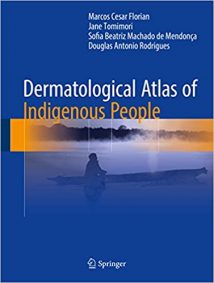نام کتاب: Dermatological Atlas Of Indigenous People
نویسنده: Marcos Cesar Florian و Jane Tomimori و Sofia Beatriz Machado De Mendonça و Douglas Antonio Rodrigues
ویرایش: ۱
سال انتشار: ۲۰۱۷
کد ISBN کتاب: ۹۷۸۳۳۱۹۵۹۴۴۶۰, ۲۰۱۷۹۴۳۵۰۷
فرمت: EPUB
تعداد صفحه: ۸۷
انتشارات: Springer International Publishing, Cham
Description About Book Dermatological Atlas Of Indigenous People From Amazon
Skin diseases are highly prevalent among indigenous people, leading to low mortality but greatly impacting their quality of life. Such diseases can be observed in indigenous people; both those living in isolated communities and those who have since been urbanized to some degree share a common characteristic of presenting different clinical patterns than non-indigenous individuals. These specificities necessitate a special approach when diagnosing dermatologic diseases in indigenous people. However, these considerations are rarely discussed in standard dermatology books.
This Atlas addresses that gap by providing specific materials for professionals involved in the health of indigenous people, especially with those who live either alone or in remote areas. It offers a comprehensive overview of the most common skin diseases in specific tribes, providing a full clinical guide on the dermatologic signs and symptoms in these individuals. Additionally, the book complements the clinical standpoint with an anthropologic perspective, examining the impact of dermatologic diseases in indigenous people and the different meaning of these diseases in their lives. Most of the material presented in this Atlas was collected in the Xingu Program, a project created in 1965 by the Federal University of São Paulo, Brazil, and devoted to providing medical care to indigenous people from the Upper Xingu region, in the heart of the Amazon rainforest. Thus, the content is primarily applicable to South American indigenous people. However, the common characteristics of the isolation and non-urbanization of these communities, as well as the anthropologic perspective adopted here, allow the content to be extrapolated to other indigenous peoples worldwide. This Atlas will be a novel and valuable resource for health professionals who work with indigenous peoples, especially in geographic areas where dermatologists are not always readily available.
درباره کتاب Dermatological Atlas Of Indigenous People ترجمه شده از گوگل
بیماریهای پوست و مو بسیار در میان مردم بومی شایع، که منجر به مرگ و میر کم اما تا حد زیادی تحت تاثیر کیفیت کتابزندگی خود را. این بیماری ها را می توان در مردم بومی مشاهده؛ هر دو کسانی که زندگی در جوامع جدا شده و کسانی که از آن زمان به برخی از سهم درجه شهری شده است یک ویژگی مشترک ارائه الگوهای مختلف بالینی نسبت به افراد غیر بومی است. این ویژگی ضروری یک رویکرد خاص زمانی که تشخیص بیماری های پوست در مردم بومی. با این حال، این ملاحظات به ندرت در پوست کتاب استاندارد بحث شده است.
این آدرس اطلس است که فاصله را با فراهم آوردن مواد خاص برای حرفه ای درگیر در سلامت مردم بومی، به خصوص با کسانی که به تنهایی یا در مناطق دور افتاده زندگی می کنند. این ارائه می دهد مروری جامع بر ترین بیماری های پوستی شایع در قبایل خاص، ارائه یک راهنمای بالینی کامل در نشانه های پوستی و علائم در این افراد است. علاوه بر این، کتاب مکمل نقطه نظر بالینی با چشم انداز anthropologic، بررسی تأثیر بیماری های پوستی در مردم بومی و معنای مختلف از این بیماری ها در زندگی خود. بسیاری از مواد ارائه شده در این اطلس در برنامه زینگو، یک پروژه در سال ۱۹۶۵ توسط دانشگاه فدرال سائو پائولو، برزیل ایجاد، جمع آوری شد و اختصاص داده شده به ارائه مراقبت های پزشکی به مردم بومی از منطقه زینگو بالا، در قلب جنگل های بارانی آمازون. بنابراین، محتوای درجه اول به مردم بومی آمریکای جنوبی قابل اجرا است. با این حال، ویژگی های مشترک از انزوا و غیر شهرنشینی این جوامع، و همچنین به عنوان چشم انداز anthropologic اینجا به تصویب رسید، اجازه می دهد که محتوای بالای مردمان بومی تعمیم شود در سراسر جهان. این اطلس یک منبع رمان و ارزشمند برای متخصصان سلامت که با مردم بومی، به ویژه در مناطقی که متخصصین پوست همیشه به آسانی قابل دسترس نیست.
[box type=”info”]![]() جهت دسترسی به توضیحات این کتاب در Amazon اینجا کلیک کنید.
جهت دسترسی به توضیحات این کتاب در Amazon اینجا کلیک کنید.![]() در صورت خراب بودن لینک کتاب، در قسمت نظرات همین مطلب گزارش دهید.
در صورت خراب بودن لینک کتاب، در قسمت نظرات همین مطلب گزارش دهید.

